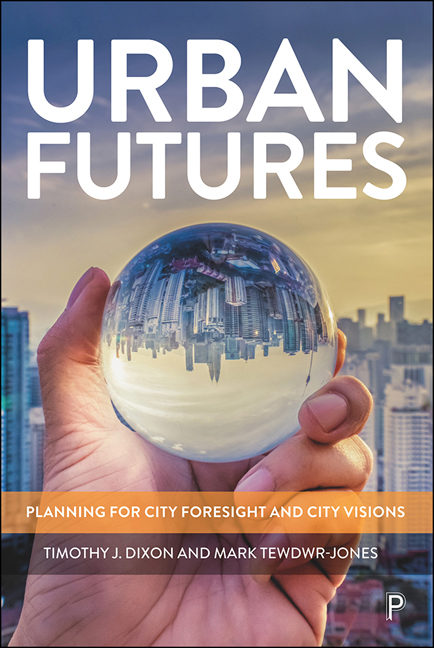Book contents
- Frontmatter
- Contents
- List of figures, tables and boxes
- Acknowledgements
- Foreword
- Preface
- 1 Urban futures: planning for city foresight and city visions
- 2 Cities and integrated urban challenges
- 3 Reimagining the city: views of the future from the past and present
- 4 Planning and governing the future city
- 5 Future narratives for the city: smart and sustainable?
- 6 Theoretical approaches to urban futures
- 7 Using city foresight methods to develop city visions
- 8 Shaping the future: city vision case studies
- 9 The innovative and experimental city
- 10 Visioning and planning the city in an urban age: a reality check
- 11 Conclusions: facing the urban future to 2050 and beyond
- Appendix: selected examples of city visions
- Notes
- References
- Index
11 - Conclusions: facing the urban future to 2050 and beyond
Published online by Cambridge University Press: 21 December 2021
- Frontmatter
- Contents
- List of figures, tables and boxes
- Acknowledgements
- Foreword
- Preface
- 1 Urban futures: planning for city foresight and city visions
- 2 Cities and integrated urban challenges
- 3 Reimagining the city: views of the future from the past and present
- 4 Planning and governing the future city
- 5 Future narratives for the city: smart and sustainable?
- 6 Theoretical approaches to urban futures
- 7 Using city foresight methods to develop city visions
- 8 Shaping the future: city vision case studies
- 9 The innovative and experimental city
- 10 Visioning and planning the city in an urban age: a reality check
- 11 Conclusions: facing the urban future to 2050 and beyond
- Appendix: selected examples of city visions
- Notes
- References
- Index
Summary
Never let the future disturb you. You will meet it, if you have to, with the same weapons of reason which today arm you against the present.
Marcus Aurelius, 2nd century AD, MeditationsIntroduction
Throughout this book, our argument has been that we need to bring four main stakeholder groups together in cities – that is, the public (or civil society), academia, local government and business – to develop participatory-based, long-term city visions. Although not predictive, these city visions can help us to plan, prepare and manage a transition to a sustainable future for our cities. Developed using a range of city foresight methods, and recognising the value of a parallel ‘science of cities’ approach and the inherent complexity of cities, these visions can help to create support and mobilise action to tackle the pressing issues of climate change, resource depletion, health and wellbeing concerns, socioeconomic disparities and other major urban challenges at a crucially important time in humanity's history. They present us with a way of looking long term, beyond short-term crises and politics, to 2050 as part of an overall framework we have called urban futures (see Chapter 1).
As we were writing this book, the COVID-19 crisis was having a huge impact on cities across the world. Directly through the substantial number of deaths, and indirectly through social distancing and restrictions on work, industry, services, education and travel, COVID-19 has had far-reaching repercussions not only on people's lives, but also on the economic activities of countries and cities globally. Because we live in an interconnected and globalised world, it is not surprising that the crisis is having substantial impacts on Gross Domestic Product (GDP) and health and welfare systems, with people in poverty living in the world's urban areas suffering disproportionately (UN-Habitat, 2020).
But crises provide opportunities as well as risks, and there is an argument for suggesting that the COVID-19 crisis, and the continuing impact of climate change, provide us with a chance to think longer term beyond the present, and reimagine the way in which cities should be like further into the future to 2030, 2050 and beyond. In the rest of this chapter, therefore, we look at three main themes that have emerged from the book: (a) city foresight, transitions theory and city visions; (b) urban planning and governance; and (c) the future for cities.
- Type
- Chapter
- Information
- Urban FuturesPlanning for City Foresight and City Visions, pp. 217 - 232Publisher: Bristol University PressPrint publication year: 2021



